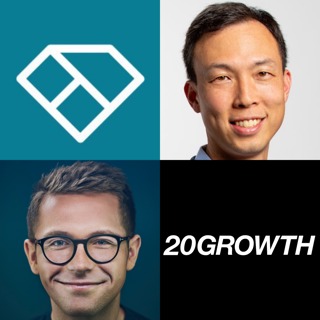
20Sales: PLG and Early Adopter Sales are Gone, How to do Sales Forecasting in 2023, Why You Cannot Do PLG and Enterprise from Day 1 at the Same Time and Which is Easier to Start, How to Onboard, Manage and Scale Reps with Rich Liu, CRO @ Everlaw
Rich Liu is the CRO @ Everlaw and a unicorn GTM exec having scaled five multi-billion dollar tech unicorns across two IPOs, a successful acquisition, and numerous funding rounds. Prior to Everlaw, Rich architected the GTM motions for companies like Navan (TripActions), MuleSoft, and Meta (Facebook). As a result of his incredible success, Rich has been recognized as a 2021 Top 100 Global Sales Leader. In Today's Episode with Rich Liu We Discuss: 1. Entry into the World of Sales: How Rich made his way from biochemistry into the world of sales? What is 1 takeaway from his time at Navan, Meta and Mulesoft that has shaped how he thinks about sales today? What does Rich know now that he wishes he had known when he entered the world of sales? 2. Sales Today: What is Happening? What are the biggest sales leaders saying today about price sensitivity and deal cycles? What has changed in the way companies buy software with the macro downturn? What do companies need to do to get deals over the line today? How do startups need to change the way they message to enterprises in order to sell today? How has the renewals process changed? What does this mean for customer success teams today? 3. PLG vs Enterprise: When and How? Is it possible to do both PLG and enterprise at the same time? Is it easier to start with enterprise and move to PLG or visa versa? How does the type of sales leader you need change dependent on the motion? When is the right time to move from founder-led sales to sales team? How does one know whether to hire a junior jack of all trades or a senior sales leader? 4. How To Hire The Best in Sales: How does Rich structure the hiring process for all new reps today? Does he use case studies to determine their depth and ability? Is the case study of the company they are interviewing at or a fresh company? What questions does Rich ask every candidate for a new role? What are some of the biggest red and green flags in how candidates talk in interviews?
7 Juni 202351min
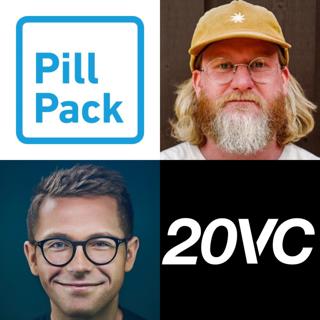
20VC: The Largest Venture Backed D2C Consumer Exit; PillPack: $0-$300M Revenues in 5 Years & The Biggest Lessons Scaling the B2B Business to $300M in 2.5 Years with TJ Parker, Co-Founder @ PillPack
TJ Parker is the co-founder and former CEO of PillPack. TJ Raised over $100M in financing, grew the company to more than 1k employees, and successfully sold the business to Amazon for $1B in 2018. As of last week, TJ was announced as the newest Partner @ Matrix Partners where he will initially focus on health opportunities from concept to series A. In Today's Episode with TJ Parker We Discuss: 1.) From Growing Up in Pharmacies to Selling to Amazon for $1BN: How did TJ seeing the pharmacy industry from his parents lead him to believe there was a $BN company to be built in the space? What does TJ know now that he wishes he had known when he started the company? What does TJ believe he is running from? How does that impact his own style of parenting? 2.) The Truth About Entrepreneurship: Why do the best founders have to get comfortable in an environment of uncertainty? What have been some of TJ's biggest lessons in how to do this? Why does TJ believe the role of the CEO is to set the vision and get out of the way? What roles can only the CEO do? How does TJ approach delegation? What have been some of his core lessons? Does TJ believe being naive is a superpower when starting a company? What do founders need to know vs what do they not need to know when starting a business? 3.) Speed of Execution and Decision-Making: How important does TJ believe speed of execution is for startups today? What can founders do to create a culture of rapid decision-making? What works? What does not? What does TJ believe are 1-2 of the single best and worst decisions he made with PillPack? What are some of the biggest mistakes TJ sees founders make both in speed of execution and then also in decision-making processes? 4.) The Crucible Moments: Lawsuits & Acquisitions: How did an incumbent come days away from shutting down PillPack? How did they save the company? How does TJ deal with those moments of intense stress? How did the Amazon acquisition come to be? Why and how did the prior acquisition fall through? Does TJ regret the sale to Amazon? How was life at Amazon post-acquisition?
5 Juni 202359min
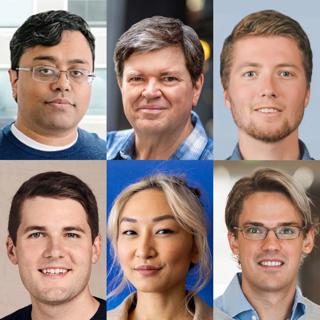
20VC: Who Wins the AI Race; Startups or Incumbents & Does Having Proprietary Data Really Matter For Startups Today?
One of the core questions in AI and investing today; who wins, startups or incumbents? Startups have speed and innovation but incumbents have scale, resources, and distribution? Today we hear from 6 leading investors and founders discussing where they place their bets who has the advantage; startups or incumbents? Emad Mostaque is CEO @ StabilityAI, the parent company of Stable Diffusion. To date, Emad has raised over $110M with Stability with the latest round reportedly pricing the company at $4BN. Yann LeCun is VP & Chief AI Scientist at Meta and Professor at NYU. He was the founding Director of FAIR and of the NYU Center for Data Science. Clem Delangue is the Co-Founder and CEO @ Hugging Face, the AI community building the future. Clem has raised over $160M from the likes of Sequoia, Coatue, Addition and Lux Capital to name a few. Sarah Guo is the Founding Partner @ Conviction Capital, a $100M first fund purpose-built to serve "Software 3.0" companies. Prior to founding Conviction, Sarah was a General Partner at Greylock. Vince Hankes is a Partner @ Thrive Capital where he has led the firm's investments in OpenAI, Melio, and Airplane.dev. Prior to Thrive, Vince learned the craft of venture from Lee Fixel @ Tiger. Tomasz Tunguz is the Founder and General Partner @ Theory Ventures, a $230M fund that invests $1-25m in companies that leverage technology discontinuities into go-to-market advantages. The Question of the Day: Who wins? Startups or Incumbents?
2 Juni 202324min
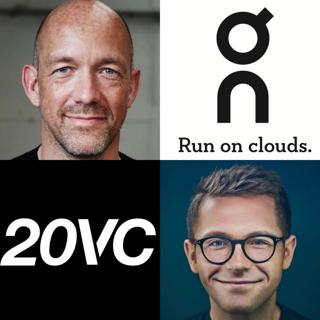
20VC: The On Running Memo: From Swiss Mountains to NASDAQ IPO: The Story of Three Friends Who Built a Sports Giant
David Alleman is the Co-Founder and Co-Chairman @ On Running one of the fastest-growing global sports brands with over 17 million products sold in 60+ countries. In 2021, On went public on the NASDAQ and today has a market cap of $8.7BN. However, it all started with three friends in the mountains experimenting with making shoes with pieces of garden hose to create a running shoe with a totally different feel. In Today's Episode with David Alleman We Discuss: 1. From the Swiss Mountains to NASDAQ IPO: What was the initial a-ha moment for David and his co-founders with On Running? How did they make the first shoes? What are some of the biggest lessons for David in V1 product build? What does David know now that he wishes he had known at the start? Is naivete always good? 2. The Launch: First Customers: How did On get their first customers? What can products and companies do to instill true customer love in those first customers? What was the hardest element of launching On to their first customers? How does David analyze and use customer feedback? What does he listen to vs not? 3. Retail: Expanding into Own Store vs Partnerships: What are some of David's biggest lessons in how to make retail partnerships successful? How can brands create amazing experiences for customers in retailers that are not their own? Why did On decide to also have their own stores? How did this change the business? What have been David's biggest learnings on what it takes to do retail well with own stores? 4. Roger Federer: Working with a Legend: How did the relationship with Roger begin? Where was the first meeting? What was it like? How did Roger come to invest in On Running? Why did On not want to do the traditional athlete endorsement deal? What role does Roger play in the company today? How does he impact product development? What have been some of the biggest lessons for David from working with Roger? How much of an impact has Roger had on On Running as a business? 5. Financing, IPOs, and Brand: Does David wish they had raised venture capital sooner? If they had more money sooner in their journey, what would David have invested in earlier? Why did they decide to go public when they did? How has the journey been post being a public company? What changes? What is the same? What brand does Davist most respect and admire? Why? What brand decisions does David most regret? What would he have done differently?
31 Maj 202344min
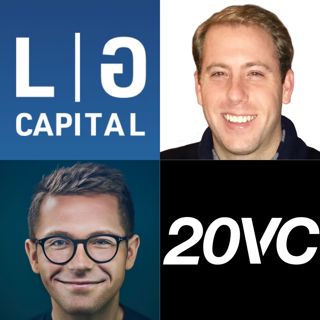
20VC: Why Financial Models at Seed, $5M Seed Rounds & The Fear of Signalling Risk is all BS | Why Multi-Stage Firms Have Destroyed Seed & Who Wins and Who Loses in the Next 10 Years of Venture with Adam Besvinick, Founding Partner @ Looking Glass Capital
Adam Besvinick is the Founder of Looking Glass Capital, a pre-seed-focused firm started in 2020. Before starting Looking Glass, Adam spent about 5 years at Deep Fork Capital and Anchorage Capital Group investing in pre-seed through Series C. Adam's portfolio across funds includes the likes of BigID, Transfix, NomNom, and Hone Health, to name a few. In Today's Episode with Adam Besvinick We Discuss: 1. How Twitter Led to Founding a Venture Firm: How did Adam make his way into the world of venture through Twitter? What are 1-2 of his biggest lessons from working with the legend, Chris Sacca? What does Adam know now that he wishes he had known at the beginning of his time in VC? What do most young VCs misunderstand when it comes to reputation? 2. Raising Fund I: The Process: How many LP meetings did Adam have to close Fund I? What docs and materials did he have for the fundraise? How does he advise other managers on doing docs for fundraises? How do different LP profiles want different things in the managers they work with? How did Adam approach first vs final close? How does he advise others managers on closing? How did Adam instil a sense of urgency in LPs to move and commit to the fund? What are 1-2 of Adam's biggest pieces of advice to managers raising a first-time fund? 3. Looking Glass: The Very Disciplined Pre-Seed Strategy: How did Adam decide on the fund size? Why is it the optimal fund size? What is the desired ownership for Adam? What level of dilution does he expect across the lifecycle of the company? What is the average check size? What is the average entry price? How does Adam approach reserves and follow-on checks? How does Adam reflect on his own relationship to price? Why does Adam not like the majority of pre-seed micro-fund strategies? 4. The Market: Multi-Stage Firms Destroying Seed Does Adam agree that "multi-stage firms have destroyed seed rounds"? How does Adam advise founders when they have multi-stage offers and seed firm offers? Who will be the winners and losers in the next 10 years of venture? Why is it harder than ever to advise founders on fundraising rounds today?
29 Maj 202343min
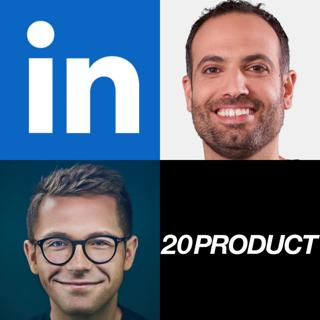
20Product: How Linkedin Does Product Reviews, A Post-Mortem on Stories, Linkedin Messenger and Spam & Why the Data Advantage in AI is Diminishing with Tomer Cohen, CPO @ Linkedin
Tomer Cohen is the CPO @ Linkedin. Since joining in 2012, Tomer has served in key leadership roles, helping launch and scale new innovative member and customer experiences. He previously led the growth and development of LinkedIn's Marketing Solutions portfolio and LinkedIn's consumer and mobile products. Prior to LinkedIn, Tomer worked as an entrepreneur with Greylock Partners and founded a company in the personal CRM space. In Today's Episode with Tomer Cohen We Discuss: 1.) From Israeli Military and Chip Design to CPO @ Linkedin: How did Tomer make his way from the Israeli military to being CPO @ Linkedin? What does Tomer know now that he wishes he had known when he became CPO? What have been some of his biggest lessons from working with Reid Hoffman? 2.) Product: Art or Science: How does Tomer determine whether product is art or science? If he were to put a number on it, what would it be? How does Tomer determine whether to go with his gut vs go with the data on product decisions? How is AI changing the role of product managers and product leaders? What do product leaders and PMs need to do to stay up to date with the latest changes in AI? 3.) Linkedin: Review of Current Products: Feed, Stories, Messenger How does Tomer analyse the success of "the feed" in Linkedin? What worked? What did not work? Why did "Stories" not work in Linkedin? What went wrong? What did they learn? What is Tomer doing to tackle the spam issue in Linkedin? What are the biggest challenges associated? Why does Linkedin still have such poor messaging service? Why is it a difficult problem to solve for? 4.) AI Changes Everything: Why does Tomer believe this wave of AI is the most significant technological shift in our lifetime? Who will win the race in AI; startups or incumbents? Which model will work most efficiently; open or closed? Will we see large enterprises prefer bundled AI options or unbundled with specialised providers?
26 Maj 202345min
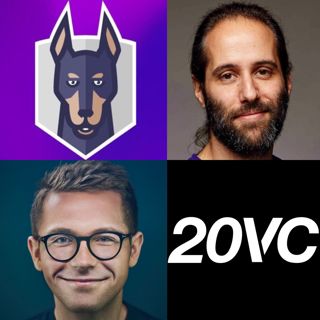
20VC: Why Being First To Market Does Not Matter, Why You Do Not Have Defensibility on Day 1, How to Analyse Market Size and Present it to Investors, Vitamins vs Painkillers; Do Vitamins Survive Recessions and Good vs Great Messaging with Guy Podjarny @ Sn
Guy Podjarny is the Founder of Snyk, the leading Developer Security platform, helping developers secure as they build. Guy was previously CTO at Akamai, co-founded Blaze.io (acquired by Akamai), and was the product manager of AppScan, the first AppSec scanner, through Sanctum, Watchfire and IBM. Guy is a public speaker, O'Reilly author, and an active early stage angel investor. In Today's Episode with Guy Podjarny We Discuss: 1.) From Israeli Military to Founding a $10BN Company: How Guy made his way into the world of startups from the Israeli military? What is Guy running away from? Why does he hate tribalism so much? Does Guy believe serial entrepreneurship is valuable or naivety of young founders is good? 2.) The Secret to Finding Product Market Fit: Why does Guy believe PMF is a poorly defined term? How does Guy define PMF? What are the single biggest mistakes founders make while searching for PMF? What are the most important elements on messaging when it comes to PMF? If you have a horizontal tool, how do you message and resonate with specific audiences? 3.) Defensibility and Being First to Market: Does Guy believe that being the first to market is really that valuable? Does Guy agree that investors expecting defensibility on day 1 is wrong? Why does Guy think market leadership is way more important than first to market? What are the true defensible moats that can be built early today? 4.) Lessons from 100 Angel Investments: What have been the single biggest lessons for Guy from his 100 angel investments? What are the biggest mistakes angels make when investing today? How should founders present their market size to investors? Where do they go wrong? Does Guy invest in both painkiller and vitamin businesses? How does he compare them? Why is Boldstart Guy's favorite venture capital firm?
24 Maj 202358min
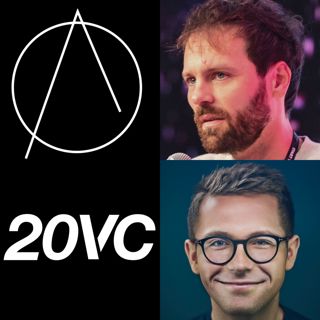
20VC: Why Your Fund Model Should Not Rely on $10BN+ Outcomes, Why the Large Funds Got Too Large, The Rise of Solo GP's; The Pros and Cons & Is Consumer Subscription Even a Good Sector to Invest in with Nico Wittenborn @ Adjacent
Nico Wittenborn is the Founder of Adjacent, one of the best early-stage firms created over the last 5 years. Before starting Adjacent, Nico spent over 3 years at Insight Partners in New York and before that learned the craft of venture from some of the best in early-stage, Point Nine, where he spent over 4 years. Nico's portfolio across funds includes the likes of Revolut, Chainalysis, Oura, RevenueCat and PhotoRoom to name a few. In Today's Show with Nico Wittenborn We Discuss: 1.) From Selling Mobile Phones to Leading Early-Stage Investor: How did Nico first make his way into the world of venture with Point Nine? What did Nico learn from his time with Point Nine and Insight? How did his time at each impact how he invests and runs Adjacent today? What does Nico know now that he wishes he had known when he started investing? 2.) Is Consumer Subscription Even a Good Place to Invest? With Calm ($2BN) and Duolingo ($6BN) as the market leaders and there only being two of them, is consumer subscription even a good place to invest? How does Nico pushback that retention for consumer subscription apps is so bad? What do many not see about consumer subscription retention numbers? How does Nico respond to the challenge of high customer acquisition cost and navigating challenging platform shifts in advertising, when investing in consumer subscription? What will the consumer subscription landscape look like in 5 years time? 3.) Adjacent: The Fund, The Strategy: Why does Nico believe if your fund model relies on $10BN outcomes, you are in trouble? How large is the latest Adjacent fund? What does the portfolio construction look like for the fund? How much diversification is the right level of diversification? How many companies per fund? How does Nico think about capital concentration on a per company basis? What are Nico's ownership requirements? How have they changed with funds? What is it about Nico's structure which enables him to be more collaborative than others? 4.) Nico: The Investor: Lessons: How does Nico reflect on his own relationship to price? When does he pay up? When does he not? What has been one of Nico's biggest misses? How has that changed his approach? Why does Nico not really compete with the large multi-stage funds? Why is Nico deliberately trying to reduce the amount of companies that he sees? 5.) The Future of Venture: How does Nico analyze the rise of solo GPs? What are the biggest pros and cons of the model? Why does Nico believe the large generalist funds are in trouble? Who is set to win and who is set to lose in the next 10 years of venture? Which seed firm would Nico invest in? Which Series A firm? Which growth firm?
22 Maj 20231h 6min






















